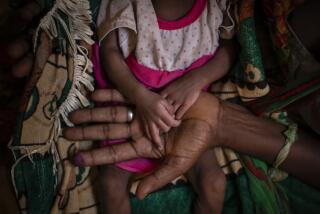More Than Food Aid for Africa
- Share via
Goodwin Cooke’s article (Editorial Pages, Feb. 19), “What Food Aid Does Not Do for Africa,” was well written and timely. Pointing out that after the hungry are fed, the job of Africa becoming self-sufficient in food production will be an “uphill struggle,” is important for all Americans to know. How unrealistic if we think that giving now will solve the problem forever and we can then insulate ourselves from the assistance it will take to prevent future famine.
Besides the many reasons Cooke listed as future obstacles to African recovery, there are others of which we should be aware. The African population growth is the fastest of any continent in history. And this will continue until adults there know that the children they produce will live. Again, we should know that the soil in many areas is naturally poor, that continent never having known an Ice Age to enrich its earth. And, as already pointed out, the education level is low and unable to keep up with the population growth. Even simple bookkeeping and accounting skills are lacking, yet necessary, for farming procedures to be effective.
There is a bill in Congress right now that addresses some of these longer-term needs as well as the immediate famine needs to the Africans. It is HR 100, the African Famine Relief and Recovery Act of 1985. Some of the longer-term recovery projects included in this bill are rehabilitation programs to benefit the poorest of the poor through agricultural development projects, health, water, forestry, and food-preservation projects. These projects would be largely implemented by private voluntary organizations. Another section of the bill addresses disaster assistance, which provides vaccines, medicines, oral-rehydration therapy, well-drilling equipment, seeds, fertilizers and tools. Yet another part addresses transportation, storage and logistics problems.
This bill needs co-sponsors now. Now is the time to write our members in Congress and ask for their support of this bill, which offers assistance of the kind that Cooke illustrates as necessary for long-term recovery.
Starvation cannot wait for our indecisiveness. Nor can African’s movement toward food self-sufficiency. Here is something concrete we can each do to forward the action.
BARBARA C. MASON
South Pasadena
More to Read
Sign up for The Wild
We’ll help you find the best places to hike, bike and run, as well as the perfect silent spots for meditation and yoga.
You may occasionally receive promotional content from the Los Angeles Times.




